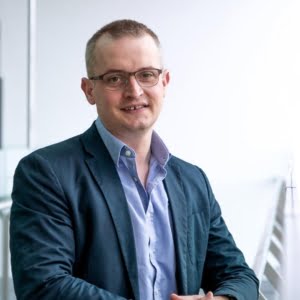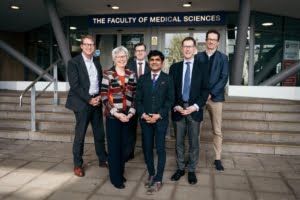Earlier this year, a group from the Lister Institute visited the lab of Dr Cynthia Andoniadou at King’s College London to find out more about her ongoing research. Cynthia won the Lister Prize in 2016 and completed her Fellowship last year.
We had a chat with her to find out more about her work and the impact that the Lister Fellowship has had on her career to date.
What’s the most exciting aspect of your current research?
One exciting finding, supported by the Prize, is now shaping our current and future research. Classically, stem cells self-renew and differentiate to generate new cells as and when the organ needs them. But we’ve identified that stem cells in the pituitary gland also have a second function: they instruct neighbouring cells to divide. This ‘paracrine signalling’ is essential for the organ to grow and is also critical during organ homeostasis (Russell et al, 2021).
We are slowly uncovering additional roles for paracrine signalling from stem cells that impact on organ function. It appears that in the endocrine system, stem cells are crucial throughout life and not just a reserve inactive (and boring!) population as previously thought. I hope that we will be able to continue research into harnessing this potential, to help modulate endocrine function in disease states, and for future regenerative approaches.
“The flexibility of Prize is unparalleled… I couldn’t let the opportunity pass me by.”
You won the Prize on your second application, but what led you to apply in the first place?
A colleague advised me to consider applying. The first time, I wasn’t invited for interview. Reading my first application back, it was obvious that I lacked confidence and didn’t believe that me or my research would be good enough to be considered. But since the flexibility of Prize is unparalleled, I couldn’t let the opportunity pass me by. I applied a second time with more maturity and confidence, outlining the research that I wanted to pursue without holding back.
What was the immediate impact of becoming a Lister Fellow?

At the time of winning the Prize, I was a couple of years into my first grant. Stringent budgeting was preventing me from delving into new areas of research that were extremely interesting but not costed for. The Prize changed this overnight.
I was able to become more adventurous and take risks to explore new hypotheses, which led us into some of the most exciting research we’ve carried out. This subsequently led to further funding. The Prize had an immediate impact on my academic career since I was promoted soon after, and I am sure that just being able to list the Prize on my CV helped with subsequent funding applications.
The Prize did not only have an impact on my own career; because of the flexibility, it supported early career researchers in my lab at times when they needed it most, such as between funding. This helped them remain in research and they are all doing remarkable work now after moving on.
What has changed for you since 2016?
As a direct consequence of the Prize, my research focus became more translational. We’ve also generated several mouse models of human endocrine disease and with our computational collaborators we have curated – and are now expanding – the Single Nucleus Pituitary Atlas as a tool for human pituitary gland research. This is something I couldn’t have imagined we would be participating in, because my lab used to have no computational expertise at all. Furthermore, we have expanded our research into the adrenal medulla, where we identified a previously undescribed population of stem cells.
Since the Prize, I have also had personal successes. The Society for Endocrinology awarded me the Starling Medal in 2022. I have also become more involved with the endocrine community, in particular the European Society of Endocrinology, serving on the Executive Committee and appointed Congress Committee Chair for the next four years. Together with brilliant basic and clinical colleagues we launched EUWIN, European Women in Endocrinology, to improve opportunities and diversity for women in endocrinology throughout Europe.
“The community feel is strong, and I consider the support invaluable.”
What does it mean to you to be part of the Lister community?
The community feel is strong, and I consider the support invaluable. Although we only formally meet once a year, the Annual Meeting is one of the most enjoyable meetings for me. Alongside hearing very stimulating talks, I get the opportunity to speak with exceptional scientists from diverse fields, about each other’s work, in a relaxed setting. I have always returned to the lab full of renewed energy and ideas from these meetings.
Furthermore, I have taken advantage of the Lister Institute mentorship scheme and have received valuable career advice. Knowing that there is a network of experienced scientists that I can connect with for advice and discussing ideas, made me feel confident as an early career researcher. Now, coming into a position where I can give back and provide support is extremely rewarding.
You can find out more about the Andoniadou Lab’s research on its website.



